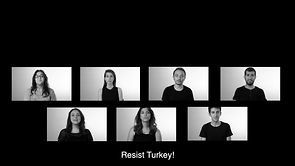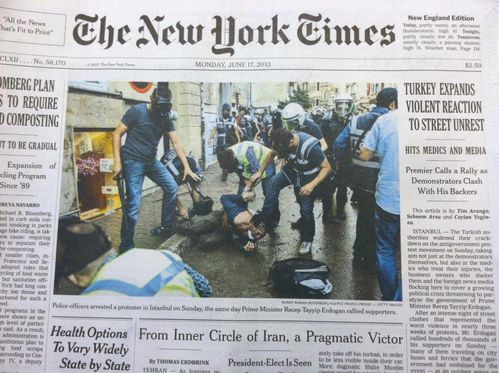Open Letter from Scholars in Canada in Solidarity with Academics in Turkey
https://docs.google.com/document/d/1BmaE-iBEBJ3IwsS570xbZw_dXkMPv_391GO-zKMWuD4/edit?pref=2&pli=1
We, scholars associated with Canadian universities, are deeply disturbed with the recent attacks on the members of the Academics for Peace initiative in Turkey. 1,128 Turkish and Kurdish scholars who signed the statement “We will not be a party to this crime,” calling on the Turkish government to end its atrocities in the Kurdish regions of Turkey, have been exposed to a campaign of abuse and violence from the Turkish state since January 10, 2016. All 1,128 of the original signatories are under an immediate threat of prosecution with the charges of “propagandising for a terrorist organization” and “overtly insulting the Turkish nation, the State of the Republic of Turkey.” Many face disciplinary proceedings and possible sackings from their academic institutions. Signatories have been subject to a campaign of public smear by pro-government press and ultra-nationalist social media users. This has further led to direct attack from fascists that have declared they will 'spill the blood' of the signatories.
The above mentioned statement by the Academics for Peace and the attacks against them unfold in a context of ongoing state violence against Kurds. Since August 2015 there have been 52 curfews imposed on over one million inhabitants in the Kurdish regions of Turkey. In such a context, the recent suppressions on academic freedom, accompanied by imprisonment and death of journalists, activists, students and lawyers, is another sign of deepening authoritarianism of the Turkish state.
We call upon the Turkish government to stop its prosecutions immediately and commit to the principles of academic freedom and free speech.
We reaffirm the Academics for Peace’s call on the Turkish government to cease their hostilities against Kurds and we stand in solidarity with these academics and express our support unconditionally.
To sign this statement, please email your name, your title and institutional affiliation to canadaacademicsforpeace@gmail.com.
List of Signators:
1. Aarzoo Singh, PhD Student, Women and Gender Studies, University of Toronto.
2. Akshaya Tankha, Phd Candidate, University of Toronto
3. Akshaya Tankha, PhD Candidate, University of Toronto
4. Alex Wilson, Professor, Seneca College
5. Alizee Badson, MA student, University of Toronto
6. Alizee Bodson, MA student, University of Toronto
7. Amir Hassanpour, Associate Professor (Ret.), University of Toronto
8. Andrei Poama, Phd-CRÉ fellow, Université de Montréal
9. Andrew Biro, Professor, Department of Politics, Acadia University
10. Andrew Brown, PhD student, York University
11. Anna M. Agathangelou, Associate Professor, York University
12. Ariel Salzmann, Associate Professor, Queen’s University
13. Asha Jeffers, PhD Candidate, York University
14. Ashley Lebner, Assistant Professor, Department of Religion & Culture, Wilfrid Laurier University
15. Ava Homa, instructor at George Brown College
16. Azam Khatam, PhD, Research Fellow, York University
17. Behzad Sarmadi, PhD Candidate, University of Toronto
18. Benjamin Mitchell, PhD (c), York University
19. Berivan Kutlay Sarikaya, Phd Student, University of Toronto
20. Brendan Bruce, Phd Candidate, York University
21. Brendan Bruce, PhD Student, York University
22. Caroline Patsias, Associate professor, Department of political science, UQAM
23. Chandler Davis, Professor Emeritus, University of Toronto
24. Christina E. Kramer, Professor, University of Toronto
25. Christopher Webb, PhD Candidate, University of Toronto, Department of Geography and Planning
26. Clarice Kuhling, Contract Faculty, Wilfrid Laurier University
27. D. Alissa Trotz, Associate Professor, University of Toronto
28. David Grondin, Associate Professor, University of Ottawa
29. David K. Seitz, Ph.D., Sessional Lecturer, Mark S. Bonham Centre for Sexual Diversity Studies, University of Toronto
30. David Ravensbergen, PhD Candidate, Department of Social and Political Thought, York University
31. Deborah Cowen, Associate Professor, University of Toronto
32. Denis Rancourt, former full professor, University of Ottawa
33. Deniz Baser, Phd Student, University of Toronto
34. Dilan Okcuoglu, Phd Candidate, Political Studies, Queen's University
35. Donald Swartz, PhD, Carleton University, Ottawa
36. Dr Judith Cohen, Contract and Adjunct Graduate Faculty (Music), York University
37. Dr. Constantin V. Boundas, Professor Emeritus, Philosophy, Trent University
38. Dr. David Butz, Professor, Department of Geography, Brock University
39. Dr. Ebru Ustundag, Associate Professor, Graduate Program Director, Department of Geography, Brock University
40. Dr. Karen Robert, Associate Professor, Department of History, St. Thomas University
41. Dr. Natalie Kouri-Towe, PhD, University of Toronto
42. Dr. Nicole S. Cohen, PhD, University of Toronto
43. Dr. Patricia Molloy, Communication Studies Department, Wilfrid Laurier University
44. Dr. Rachel Berger, Associate Professor, History Department, Concordia University
45. Dr. Sedef Arat-Koc, Associate Professor, Department of Politics and Public Administration, Ryerson University
46. Elif Genc, PhD student, New School for Social Research
47. Elise Thorburn, Postdoctoral Fellow, Brock University
48. Elizabeth Dauphinee, Professor, York University
49. Evan Johnston, Resource Coordinator, York University Graduate Students' Association
50. Farzad Omarzadeh, faculty of engineering, University of western ontario
51. Fethi Karakecili, Ph.D Candidate in Ethnomusicology, York University
52. Feyzi Baban, Associate Professor, Political Studies and International Development, Trent University
53. Frédérick Guillaume Dufour, Professeur de sociologie, UQAM
54. Frederick Peters, PhD,, Principal Research Fellow, York University
55. Gale P. Coskan-Johnson, Assistant Prof. of Writing and Rhetoric Chair, Brock University
56. Ganaele Langlois, Assistant Professor, York University
57. Gavin Fridell, Associate Professor, Saint Mary's University
58. Geneviève A. Dumas, PhD, PEng, Professor, Queen's University,
59. Genne Speers, PhD Candidate, York University
60. George C. Comninel, Associate Professor, York University
61. Gokboru S. Tanyildiz, PhD Candidate, York University
62. Greg Albo, Professor, Political Science, York University
63. Gregory Shupak, PhD, University of Guelph-Humber
64. Guertin Tremblay, Professeur de géographie, Cégep Marie-Victorin, Montréal, Québec
65. Gulay Kilicaslan, Phd Student, York University
66. Guliz Akkaymak, Phd candidate, The University of Western Ontario
67. Haideh Moghissi, Professor Emerita and Senior scholar, York University
68. Haroon Akram-Lodhi, Trent University
69. Heather Macfarlane, Assistant Professor, Queen's University
70. Henry Heller, Professor, University of Manitoba
71. Ilan Kapoor, Professor, York University
72. Ingo Brigandt, Associate Professor and Canada Research Chair, University of Alberta
73. Irina Ceric, Criminology Instructor, Kwantlen Polytechnic University
74. Jaffer Sheyholislami, Associate Professor, Carleton University
75. James A. Reilly, Professor, Modern Middle East History, University of Toronto
76. James Alexander Forbes, PhD Candidate, York University
77. James Davies, PhD, Department of Philosophy, University of Toronto
78. James Deutsch, Assistant Professor, University of Toronto
79. James Nugent, PhD Candidate-Course Instructor, University of Toronto
80. Jamie Magnusson, Ph.D., Program Coordinator, Adult Education and Community Development, Head, Centre for Women's Studies in Education, Associate Professor, Adult Education, Department of Leadership, Adult and Higher Education, OISE, University of Toronto
81. Janet E. Mullin, PhD, St. Thomas University in Fredericton
82. Jeannette Gaudet, Associate Professor, St. Thomas University
83. Jeff Shantz, Full Time Faculty Member, Kwantlen Polytechnic University
84. Jennifer Cypher, PhD, Faculty of Environmental Studies, York University, Chairperson, CUPE 3903
85. Jenny Wüstenberg, PhD, DAAD Visiting Assistant Professor, York University
86. Jens Hanssen, Associate Professor, University of Toronto
87. João Shannon Pinto Sterrett, PhD Candidate, University of Victoria
88. Jonathan Adjemian, PhD Candidate, York University, Toronto
89. Justin Paulson, Associate Professor, Carleton University
90. Karen Pearlston, PhD, University of New Brunswick
91. Kate Ervine, Assistant Professor, Saint Mary's University
92. Katie Hemsworth, Assistant Professor, Queen's University
93. Kaziwa Salih, PhD, Queen's university
94. Kevin A. Gould, Associate Professor, Concordia University
95. Kevin Pask, Professor, Concordia University
96. Khashayar Hooshiar, Contract faculty, York University
97. Konstantin Kilibarda, Adjunct Lecturer, McMaster University
98. Kristi Allain, Assistant Professor, Department of Sociology, St. Thomas University
99. Kumru Bilici, Research Assistant, Carleton University, Ottawa
100. Laura G. Pin, PhD Candidate, York University
101. Laurence Packer, professor of biology, York university
102. Laurie E. Adkin, Ph.D., Associate Professor, University of Alberta
103. Leda Raptis, PhD, Queen’s University
104. Lisa Mills, Associate Professor, Carleton University
105. Luin Goldring, Professor, Sociology, York University, Toronto
106. Luke Roelofs, PhD Graduate, University of Toronto
107. M. Derya Tarhan, PhD Student, University of Toronto
108. Maggie Sager, Masters Student, Near and Middle Eastern Cultures, University of Toronto
109. Mahiye Seçil Daǧtaș, PhD, Assistant Professor, Department of Anthropology, University of Waterloo
110. Maral salek, Graduate Student, Ryerson University
111. Mathieu Forcier, Doctorant en sociologie, Université de Montréal
112. Matt Jones, Course Instructor, Drama and Performance Studies, University of Toronto Scarborough
113. Max Haiven, Assistant Professor, Nova Scotia College of Art and Design
114. Melissa Levin, PhD, University of Toronto
115. Michael Lambek, FRSC Canada Research Chair & Chair , University of Toronto
116. Mustafa Koc, Professor, Ryerson University
117. Natalie Zemon Davis, Professor, University of Toronto
118. Nicole Laliberte, Assistant Professor, University of Toronto
119. Nil Basdurak, PhD in Ethnomusicology, University of Toronto
120. Noa Shaindlinger, PhD Candidate, University of Toronto
121. Omar Sirri, PhD Student, University of Toronto
122. Oscar Jarzmik, PhD candidate, Department of Near and Middle Eastern Civilizations, University of Toronto
123. Ozlem Aslan, Phd Student, University of Toronto
124. Paul Kingston, Associate Professor, Political Science Director, University of Toronto
125. Ratiba HADJ-MOUSSA, Associate Professor, Sociology, York University, Toronto
126. Rinaldo Walcott, Associate Professor, University of Toronto
127. Robert Brym, FRSC SD Clark Professor, University of Toronto
128. Saeed Rahnema, Professor rtd., York University
129. Saman Lagzi, Graduate Student, University of Waterloo
130. Samuel Walker,Ph.D. Candidate, University of Toronto
131. Sandra Smele, PhD Candidate, York University
132. Sandra Whitworth, Professor, Political Science, York University
133. Sara Carpenter, PhD, Assistant Professor | Adult, Community, and Higher Education, Department of Educational Policy Studies, Faculty of Education, University of Alberta
134. Sarah T. Roberts, PhD, Assistant Professor, Faculty of Information and Media Studies (FIMS), Western University
135. Sardar Saadi, PhD student, University of Toronto
136. Scott Forsyth, Associate Professor, York University
137. Secil Dagtas, Assistant Professor, University of Waterloo
138. Secil Erdogan, Assistant Professor, York University
139. Selmin Kara, Assistant Professor, OCAD University
140. Sergio R. Arcaro, English Instructor, Centennial College
141. Shawn Blizzard,MS Student, York University
142. Sheila Wilmot, PhD, Course Instructor, Ryerson University, Toronto
143. Siavash Saffari, PhD, SSHRC Postdoctoral Fellow, Columbia University
144. Sona Kazemi, Phd student, University of Toronto
145. Srdja Pavlovic, PhD, University of Alberta
146. Stephanie Bethune, MA Candidate, University of Victoria
147. Stephen L. Newman, Associate Professor, York University
148. Steven Tufts, Associate Proffesor, York University
149. Teresa Heffernan, Professor, Department of English, Saint Mary's University
150. Terry Maley, PhD, Associate Professor and MA Coordinator, Department of Political Science, York University
151. Tracy Glynn, Lecturer, St. Thomas University
152. Val Marie Johnson, Associate Professor, Sociology, Criminology, Women & Gender Studies, Saint Mary's University
153. Vinh Nguyen, Ph.D, Assistant Professor, Renison University College, University of Waterloo
154. Vivian Solana, PhD Candidate, University of Toronto
155. William Payne, PhD Candidate - Critical Human Geography, York University




